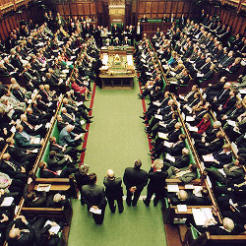Departing shadow charities minister Gareth Thomas yesterday led criticism of the speed with which the lobbying bill is progressing through Parliament as well as the lack of consultation prior to its publication during debate in Westminster yesterday.
Ahead of the report stage of the bill in the House of Commons yesterday, Tom Brake MP, deputy leader of the House, introduced a new programme motion setting out the timeframe for the bill, which today reaches its third reading.
Thomas, who was until this week’s reshuffle shadow minister for civil society, argued that the bill “is being rushed through Parliament”.
“It has attracted huge concern from across the third sector about the chilling impact it will have on the perfectly legitimate campaigning activities of charities, so detailed line-by-line consideration could have begun to make up for the lack of consultation with charities before the bill was published,” Thomas argued.
Thomas asked the leader of the House to set out who he, and the ministers involved in drafting the bill, consulted with during drafting.
Fellow Labour MPs Graham Allen, Hywel Francis and Huw Irranca-Davies joined Thomas in objecting to the timetabling.
Irranca-Davies told Parliament that opposition to the bill was unprecedented. “I have never had as many requests in objection to a bill from community groups as I have on this bill. Those people want us to take our time and get this right," he said. "They feel at the moment it is an utter dog’s breakfast.”
MPs voted in favour of the programme motion, which stipulated that the first part of the bill would be debated yesterday evening and parts 2 to 4 today.
MPs concerned lobbying bill will limit their work with charities
During the debate that followed MPs raised concerns that the bill could prevent MPs from working with charities.
Conservatives too showed some consternation about the impact on the bill. Tory MP for Chesham and Amersham Cheryl Gillan said: “I have taken a great interest in autism and introduced a private member’s bill that ultimately became an Act. I worked with the National Autism Society, which provided me with back-up, information and material for distribution among colleagues. I worry that the bill would inhibit any MP in acting that way.”
NCVO writes to MPs
Sir Stuart Etherington, chief executive of NCVO, has today written to MPs in response to a letter from Andrew Lansley, leader of the House. In his letter Sir Stuart warns: “The overall effect will therefore be that more charities and voluntary organisations will be subject to the enhanced and much more onerous rules.”
Lansley had sought to reassure MPs that the amendments to the bill would meet the commitment to “provide clarification and reassurance to charities, voluntary organisations and community groups that their normal engagement with public policy will not be subject to regulation – as long as it cannot reasonably be regarded as intended to promote or procure the electoral success of a party or candidate”.
However Etherington told MPs that although the new wording for what is considered “controlled expenditure” is similar that in the previous legislation, NCVO is concerned that the application of that definition has now been expanded and expenditure thresholds have been lowered.
Last week NCVO and Acevo issued a joint statement claiming that the ammendments did not go far enough. Sir Stephen Bubb, chief executive of Acevo, was also critical of how quickly the bill was progressing.









